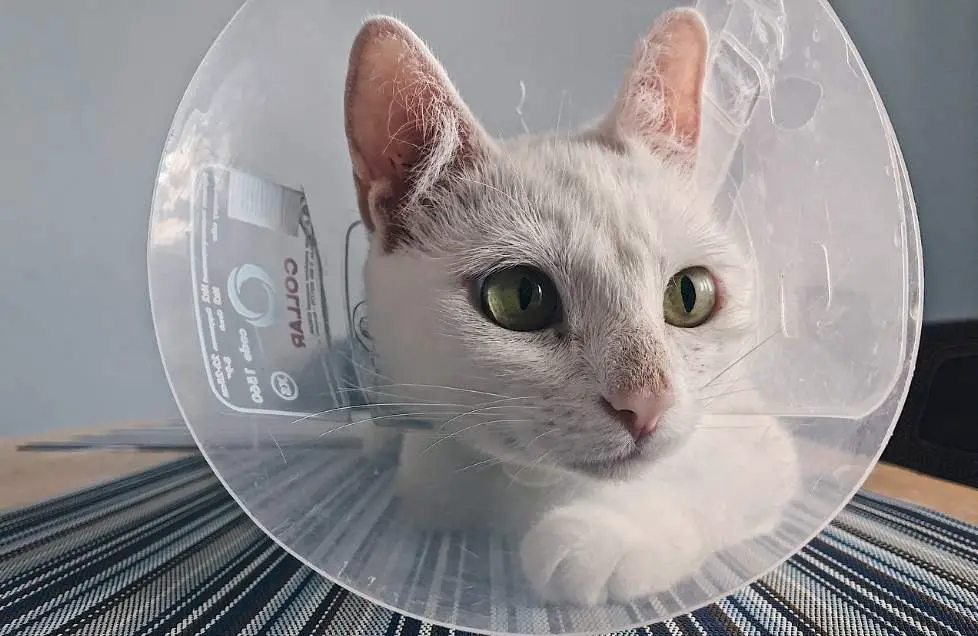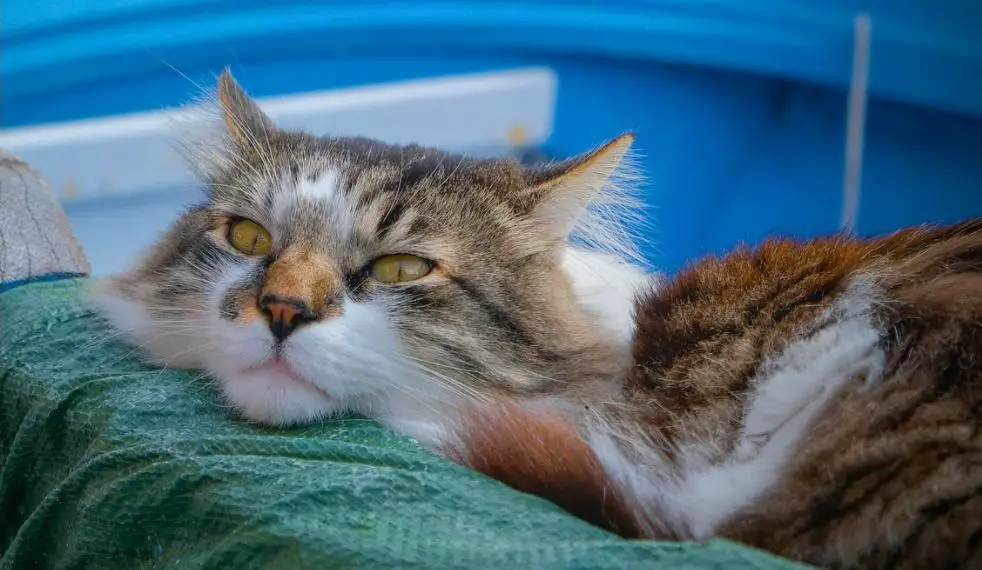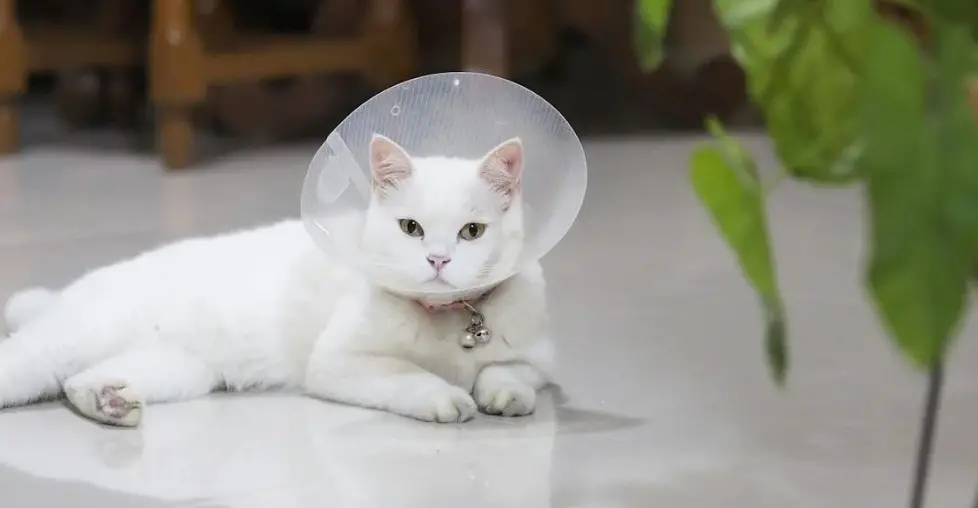My friend recently spayed her female cat, maybe because of the benefits of spaying female cats and the fact she had no intention of breeding her cat, I talked to her to understand the process and the behavior of her female cat after the spaying procedure.
In this post, I’ll be sharing some female cat behavior after spaying, which my friend who recently spayed her female cat observed.
I also asked other cat owners in my group online who spayed their female cats for more information, you should keep reading to find out more…
Benefits of Spaying Your Female Cat
In my opinion, spaying your female cat offers several important benefits to both you and your cat.
Firstly, it helps prevent unwanted pregnancies in female cats, reducing the number of homeless cats and the strain on animal shelters.
Secondly, spaying your female cat eliminates the risk of uterine infections and certain reproductive cancers, promoting your cat’s long-term health.
Additionally, spayed female cats are less likely to exhibit aggressive or territorial behavior, making them more pleasant companions.
Lastly, spaying your female cats can also help reduce the strong odor associated with a female cat in heat, making your home a more pleasant environment for both you and your furry friend.
Female Cat Behavior After Spaying

After talking with my friend who recently spayed her female cat, here are some of the most common female cat behavior after spaying:
1. Decrease in aggressive behavior towards other cats
Based on what my friends who spayed their female cats observed, one noticeable change in female cats after spaying is a decrease in aggressive behavior towards other cats.
This can be attributed to the fact that spaying removes the hormonal fluctuations that can contribute to territorial behavior and aggression.
Without the influence of reproductive hormones, female cats tend to become more calm and relaxed around other feline companions.
So, if you’ve noticed your female cat being feisty and confrontational with other cats before, spaying could help mellow her out and promote a more harmonious living environment.
2. Improved social behavior
Another positive change you might observe in your spayed female cat is an improvement in her social behavior.
Spaying can help reduce the instinctual need for dominance and territorial marking, which can sometimes lead to conflicts with other cats.
This newfound calmness can make your female cat more open to social interactions and may even lead to stronger bonds with her feline and human companions.
You should also notice her being more affectionate, seeking out cuddles, and enjoying the company of others.
3. Reduced roaming tendencies
Based on what I know about cats, I can tell you that female cats who haven’t been spayed may exhibit a strong desire to roam and explore their surroundings in search of a mate.
This behavior is driven by their natural instinct to reproduce. However, after spaying, the hormonal drive to seek out a mate diminishes, resulting in reduced roaming tendencies.
Your spayed female cat is more likely to stay closer to home, content with the comfort and safety of her familiar environment.
This can help prevent her from getting lost, injured, or exposed to certain risks that come with roaming outdoors.
4. Increased affection and calmer behavior
After spaying, many female cats experience an increase in affectionate behavior and overall calmness.
This can be attributed to the absence of hormonal fluctuations that can sometimes make cats more irritable or agitated.
Without the influence of reproductive hormones, your spayed female cat may become more relaxed and content, seeking out more cuddles and quality time with her human companions.
You might notice her purring more often, rubbing against your legs, or even curling up on your lap for extended periods.
It’s truly heartwarming to see how spaying your female cat can enhance the bond between you and your female cat.
5. Temporary changes in appetite
According to some of my friends who spayed their female cats, it’s not uncommon for a spayed female cat to experience temporary changes in appetite.
This behavior in their opinion can manifest as either an increase or decrease in food consumption.
Some female cats may have an increased appetite due to the absence of reproductive hormones, while others may experience a temporary decrease in appetite as they recover from the surgical procedure.
It’s important to monitor your female cat’s eating habits and consult with your veterinarian if you have any concerns.
Generally, these changes in appetite should normalize within a few days to a couple of weeks.
6. Improved litter box habits
Spaying can also have a positive impact on a female cat’s litter box habits.
Without the influence of reproductive hormones, cats are less likely to engage in urine marking or spraying behaviors.
Additionally, spaying can reduce the chances of developing urinary tract infections or other medical conditions that may lead to litter box aversion.
As a result, you may notice improved litter box habits in your spayed female cat, with fewer incidents of accidents or inappropriate elimination.
Providing a clean and accessible litter box in a quiet area of your home will further encourage good litter box habits.
7. Less marking behavior
According to my friends who spayed their female cats, one significant change you might notice in your female cat after spaying is a decrease in marking behavior.
Female cats, like their male counterparts, have a natural instinct to mark their territory by spraying urine.
However, spaying removes the hormonal drive behind this behavior, leading to a reduction or even cessation of marking.
This can be a relief for cat owners, as it helps maintain a cleaner and more odor-free environment.
So, if you’ve been dealing with the frustration of your female cat leaving her scent around the house, spaying can greatly alleviate this issue.
Related: female cat in heat behaviors.
8. Lethargy during recovery
During the recovery period after spaying, it’s common for female cats to experience some degree of lethargy.
This is a natural response to the surgery and anesthesia. Just like humans, female cats after spaying need time to recover and regain their energy.
You might notice your female cat being less active, sleeping more than usual, and showing a decreased interest in play or exercise.
It’s important to provide a calm and comfortable space for your female cat to rest and heal during this time.
However, if you notice any extreme or prolonged lethargy, it’s always best to consult with your veterinarian to ensure there are no complications.
9. Temporary increased grooming
Another behavior you may observe in your spayed female cat is a temporary increase in grooming.
In the days following surgery, female cats may groom themselves more frequently as a way to comfort and soothe themselves during the healing process.
This increased grooming helps to keep the surgical site clean and aids in the removal of any lingering scents from the veterinary clinic.
While it’s normal for cats to groom themselves, keep an eye out for excessive licking or grooming that may cause irritation to the surgical site.
If you notice any redness, swelling, or signs of discomfort, consult your veterinarian for proper guidance.
Read more about cat behavior problems.
Observing and Supporting Your Spayed Female Cat

During the recovery period, it’s essential to keep a close eye on your cat to ensure she heals properly and adjusts well to her new hormonal balance.
Here are a few tips:
Provide a Quiet and Comfortable Space: Ensure she has a quiet place to rest away from other pets and household activities.
Monitor the Incision Site: Check the surgical site daily for signs of infection, such as redness, swelling, or discharge.
Limit Physical Activity: Prevent your cat from jumping and running for at least a week post-surgery to avoid complications.
Offer Nutritious Food: Feed her a balanced diet and monitor her weight to prevent obesity.
Engage in Gentle Play: Once she’s healed, engage her in gentle play to keep her physically and mentally stimulated.
Related: female cat behavior after mating.
What To Expect Immediately After Spaying Your Female Cat
Due to the sedation, you should expect your female cat may appear a little drowsy and confused after her spay procedure.
According to my friends who spayed their female cats, they said that it is typical to have some little swelling or redness at the location of the incision.
My friend also advised that you should always monitor your female cat after spaying to ensure she isn’t licking or irritating the incision.
Your veterinarian could advise you to give painkillers to your female cat or provide you with detailed advice on how to care for your cat while she heals.
Related: Unspayed female cat behavior.
Final Thoughts
In summary, spaying your female cat can have a positive impact on her behavior.
After the procedure, you can expect a decrease in aggressive tendencies and territorial marking, creating a more harmonious home environment.
Additionally, spaying helps prevent certain reproductive health issues, promoting a happier and healthier life for your feline companion.
Read more about cats not getting along with other cats.
Related Questions
Will Spaying Change My Cat’s Personality?
Spaying your female cat will not change her personality. In fact, it can help reduce unwanted behaviors like roaming, irritability, and aggression. Your cat will remain the same loving and affectionate companion she always was.
How Will My Cat Act After Spaying?
Immediately after spaying, your cat may seem a bit groggy and disoriented due to the anesthesia. She may also be a bit more timid or jumpy during the recovery period. However, these changes are temporary, and your cat should bounce back to her normal self within a few days.
Will My Cat Still Go into Heat After Spaying?
No, spaying your female cat will eliminate her heat cycles. This means she won’t exhibit the typical behaviors associated with being in heat, such as vocalization, restlessness, and increased affection-seeking. Your cat will be much more relaxed and content without these hormonal fluctuations.
Can I Expect Any Long-Term Changes in My Cat’s Behavior After Spaying?
While your cat may adjust to the surgery initially, there are no long-term changes to her personality or behavior. Spaying can actually improve her overall demeanor by reducing undesirable behaviors and making her a more laid-back and easygoing companion.









